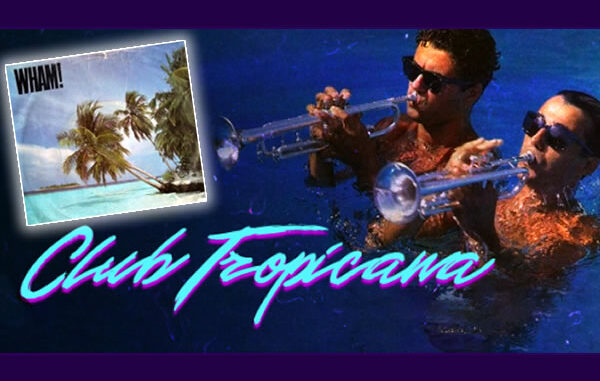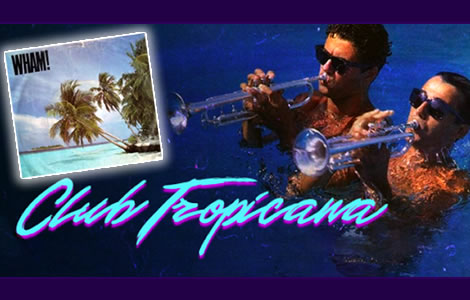
In the early 1980s, the British pop duo Wham!, consisting of George Michael and Andrew Ridgeley, emerged as a dominant force in the music scene. One of their most iconic songs, “Club Tropicana,” released in 1983, became an anthem of escapism and hedonism.

The song provided a stark contrast to the socio-political climate of Margaret Thatcher’s Britain, offering a vibrant, carefree alternative to the harsh realities of the time.
The Song: An Anthem of Escapism
“Club Tropicana” was released as the third single from Wham!’s debut album, “Fantastic.” The song’s upbeat tempo, catchy melody, and playful lyrics immediately resonated with audiences, particularly the youth. It painted a picture of a utopian paradise, a place where worries and responsibilities were left behind, and enjoyment was the order of the day.
The lyrics of “Club Tropicana” describe an idyllic holiday destination where “fun and sunshine” are free, and the drinks “cost nothing.”
This imagery of an all-inclusive, carefree holiday was appealing to many who felt the pressures of the socio-economic environment in Britain at the time.
The chorus, with its infectious lines, “Club Tropicana, drinks are free / Fun and sunshine, there’s enough for everyone,” encapsulates the spirit of the song—an invitation to a paradise where all are welcome.
The Political Context: Margaret Thatcher’s Britain
In 1983, Britain was under the leadership of Prime Minister Margaret Thatcher, whose conservative policies and economic measures had a profound impact on the country.
Thatcher’s government implemented sweeping changes aimed at reducing the power of trade unions, privatizing state-owned industries, and promoting free-market capitalism.
While these policies were intended to revitalize the British economy, they also led to significant social upheaval, including rising unemployment, industrial strife, and growing inequality.
For many young people in Britain, the early 1980s were characterized by economic uncertainty and limited opportunities. Against this backdrop, “Club Tropicana” offered a form of escapism, a fantasy of a better place where one could escape the hardships of daily life.
The song’s promise of a carefree existence and its imagery of sun-soaked beaches and endless fun provided a stark contrast to the grim reality faced by many.
The Music Video: A Visual Feast
The music video for “Club Tropicana,” directed by Duncan Gibbins, further enhanced the song’s escapist theme. Filmed in Ibiza, Spain, the video features George Michael and Andrew Ridgeley enjoying the luxuries of a tropical paradise.
They are seen lounging by the pool, sipping cocktails, and frolicking on the beach, surrounded by beautiful people and picturesque scenery.
The video is a celebration of excess and pleasure, with a humorous twist. It parodies the aspirational lifestyles often depicted in advertising and media, with George Michael and Andrew Ridgeley playing the roles of fun-loving holidaymakers.
The video’s playful tone and glamorous setting perfectly complemented the song’s themes, making it a hit on music television channels and further solidifying Wham!’s image as purveyors of fun and escapism.
The Nightclub Era: A Booming Scene
The early 1980s saw a boom in the nightclub scene, particularly in the UK. Nightclubs became the epicentres of youth culture, offering a place for people to dance, socialize, and escape from the pressures of everyday life.
The music of the time, characterized by upbeat pop and dance tracks, provided the perfect soundtrack for this hedonistic lifestyle.
“Club Tropicana” fit seamlessly into this environment, becoming an anthem for the nightclub era. The song’s themes of enjoyment and liberation resonated with club-goers, who embraced the opportunity to let loose and have fun.
Nightclubs began hosting beach-themed parties, complete with tropical décor and cocktails, inspired by the imagery of “Club Tropicana.” These events allowed people to experience a taste of the paradise depicted in the song, even if only for a night.
The Legacy of “Club Tropicana”
“Club Tropicana” remains one of Wham!’s most beloved songs, remembered for its infectious melody, carefree lyrics, and iconic music video.
It represents a moment in time when music provided a necessary escape from the socio-political climate, offering a form of respite and joy.
The song’s success also contributed to Wham!’s rise to stardom. George Michael and Andrew Ridgeley became household names, with their music symbolizing the youthful exuberance and rebellious spirit of the era.
“Club Tropicana” helped to establish their reputation as pop icons, capable of capturing the zeitgeist with their catchy tunes and charismatic performances.
Relive it on Capitol fm, the Rebuff and a Relief
“Club Tropicana” stands as a cultural artefact of the 1980s, a testament to the power of music to provide solace and escape. In an era marked by political and economic challenges, the song offered a fantasy of a better place, a paradise where one could forget their troubles and simply enjoy life.
Its success and enduring popularity highlight the timeless appeal of music that can uplift and transport listeners, even if only for a few minutes. For many, “Club Tropicana” was more than just a hit song—it was a symbol of hope and happiness in a difficult time.
